"To discover to the world something which deeply concerns it, and of which it was previously ignorant; to prove to it that it had been mistaken on some vital point of temporal or spiritual interest, is as important a service as a human being can render to his fellow creatures..." John Stuart Mill, "On Liberty"
Wednesday, December 27, 2023
Daniel Sokatch: A Pivotal Figure in Modern Jewish Dialogue and Israeli Affair is Redefining Jewish Advocacy
Monday, December 11, 2023
Unmasking the Elepahant
Monday, December 4, 2023
Jonathan Taplin vs. the tech billionaires
 Jonathan Taplin, a film producer, scholar, and director emeritus of the Annenberg Innovation Lab, is a vocal critic of excessive techno-optimism. In his book, "The End of Reality: How Four Billionaires are Selling a Fantasy Future of the Metaverse, Mars, and Crypto," he argues that the California-centric billionaires Peter Thiel, Elon Musk, Mark Zuckerberg, and Marc Andreessen are diverting public attention from critical issues. He criticizes the media's role in glorifying them and advocates for a cultural shift that emphasizes real solutions over escapist narratives.
Jonathan Taplin, a film producer, scholar, and director emeritus of the Annenberg Innovation Lab, is a vocal critic of excessive techno-optimism. In his book, "The End of Reality: How Four Billionaires are Selling a Fantasy Future of the Metaverse, Mars, and Crypto," he argues that the California-centric billionaires Peter Thiel, Elon Musk, Mark Zuckerberg, and Marc Andreessen are diverting public attention from critical issues. He criticizes the media's role in glorifying them and advocates for a cultural shift that emphasizes real solutions over escapist narratives.My California Sun podcast with Jonathan Taplan:
Tuesday, November 28, 2023
From Poverty to Empowerment: The Rise of the Global Middle Class
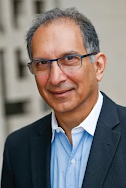 The middle class stands as the most successful demographic in world history. By the time we reach 2030, it's projected that the fifth billionth person will have joined its ranks. This journey, which began just over two centuries ago by people in pursuit of a better life, has sparked an unparalleled global transformation.
The middle class stands as the most successful demographic in world history. By the time we reach 2030, it's projected that the fifth billionth person will have joined its ranks. This journey, which began just over two centuries ago by people in pursuit of a better life, has sparked an unparalleled global transformation.In today's landscape, where half of the global population finds themselves at or above the middle-class threshold, the work of my guest
Monday, November 27, 2023
Robert Sapolsky and Our Illusion of Free Will
My California Sun conversation with Robert Sapolsky:
To access my conversation with Robert Sapolsky, please go to our new Substack page By doing so, and signing up, you'll receive them directly in your email and ensure that you don't miss anything during our transition to Substack.
Tuesday, November 21, 2023
Don’t Shoot the Messenger: The Methods and Power of Pollsters

In this WhoWhatWhy podcast I talk with Scott Keeter, the senior survey adviser at Pew Research Center. In this role, he guides all of Pew’s research and polling. An expert on American public opinion and political behavior, he is a co-author of four books on the subject.
Keeter discusses the complexities of modern polling amid a climate of skepticism and change. As the 2024 elections approach, Keeter confronts the polling industry’s pressing issues: dwindling response rates and the public’s eroding trust in institutions.
My conversation with Scott Keeter:
To access my conversation with Scott Keeter, please go to our new Substack page By doing so, and signing up, you'll receive them directly in your email and ensure that you don't miss anything during our transition to Substack.
Wednesday, November 15, 2023
A Conversation with Heather Cox Richardson
In an era marked by relentless political turmoil, authoritarian threats, and pervasive societal corruption, Richardson's work serves as a crucial reminder: these challenges are not sudden anomalies but the culmination of a long, complex history.
Through her latest book, 'Democracy Awakening,' Richardson provides more than a mere chronicle of events. She offers a critical narrative that links our past to the present, shedding light on how America, once a beacon of democracy, now hovers dangerously close to autocracy. Her analysis is not just about understanding our history; it's about charting a course back to democratic principles.
Monday, November 6, 2023
From Buy to Cell: The Journey of SBF
Faux, a Bloomberg investigative reporter who has covered SBF and the crypto craze since the beginning, spent time with SBF in the Bahamas and sat in the courtroom every day of the trial. Faux’s investigation into the $3 trillion crypto delusion offers a sobering look at our financial epoch which is defined by SBF’s rise and fall.
Monday, October 30, 2023
 On this week’s WhoWhatWhy podcast, I explore the intricate landscape of global terrorism, the Israeli-Palestinian conflict, and the geopolitical reverberations of recent events.
On this week’s WhoWhatWhy podcast, I explore the intricate landscape of global terrorism, the Israeli-Palestinian conflict, and the geopolitical reverberations of recent events.My guest is Kenneth Katzman, a senior adviser with The Soufan Group and a preeminent expert on the Middle East. Specializing in Iran, the Persian Gulf states, Iraq, and Afghanistan, Katzman has previously served as a senior analyst at the Congressional Research Service and an analyst at the CIA.
My conversation with Kenneth Katzman:
To access my conversation with Ken Katzman, please go to our new Substack page By doing so, and signing up, you'll receive them directly in your email and ensure that you don't miss anything during our transition to Substack.
Monday, October 23, 2023
Navigating the New Geopolitics: A Conversation with Sam Ramani
Ramani describes our global politics as increasingly volatile due to the erosion of international law and the rise of a multipolar world. He views Russia's invasion of Ukraine not merely as a breach of sovereignty but as a symptom of a larger, systemic decay in international norms.
Tuesday, October 17, 2023
Carl Safina on Nature, Philosophy, and Unexpected Teachers
My conversation with Carl Safina:
Sunday, October 15, 2023
Can America Survive Its Own Constitution? The Tyranny of the Minority
Ziblatt argues that the nation’s precarious condition is defined by two contrasting views of what George Washington called “the last great experiment for promoting human happiness”: one that aspires toward a multiracial, multicultural democracy focused on equity and inclusion, and another that leans toward authoritarianism — a dichotomy Ziblatt says is epitomized by the events of January 5 and 6.
Saturday, October 7, 2023
The Invisible Frontlines: Israel’s Secret War Against a Nuclear Iran
October 6, 2023 — While Iran may not be dominating today’s headlines, its nuclear ambitions are as fervent as ever. Equally unyielding is Israel’s determination — covert or otherwise — to thwart these ambitions.
On this week’s exclusive WhoWhatWhy podcast, Yonah Jeremy Bob, a senior analyst for the Jerusalem Post and former high-ranking Israeli official, pulls back the curtain on Israel’s covert operations against Iran.
Bob’s latest book, Target Tehran, offers a rare glimpse into Israel’s multilayered strategy to counter Iran through sabotage, cyberwarfare, assassination, and secret diplomacy.
My WhoWhatWhy conversation with Yonah Jeremy Bob:
Monday, September 18, 2023
When the Game Was War: The 1987-88 NBA Season: A Conversation with Rich Cohn
Teams and athletes often define more than games; they encapsulate eras and collective memories. While some teams symbolize a specific year, like the 1998 Yankees, others represent an entire era, such as the Celtics from 1960 to 1966. Rarely, individual athletes like Tiger Woods in 2000 become the face of a time period. Even rarer is a year that defines an entire league, and for the modern NBA, that was the 1987-1988 season. It was a pinnacle year featuring iconic battles and drama with legends like Magic Johnson and Michael Jordan. Today, we're joined by Rich Cohen, a New York Times bestselling author and columnist, to discuss his latest book, "When the Game was War," which delves into this unforgettable NBA season.
My conversation with Rich Cohn:
To access my conversation with John Coates, please go to our new Substack page By doing so, you'll receive them directly in your email and ensure that you don't miss anything during our transition to Substack.
Tuesday, September 5, 2023
Power Play: How Just 12 People Control America’s Economic Destiny: A conversation with John Coates
Saturday, August 26, 2023
Living History: A Conversation with Drew Gilpin Faust on the Pivotal Moments That Shaped Her and All of Us
Wednesday, July 26, 2023
Can Boomers Ever Age Out Gracefully? A Conversation with Dr. Rosanne Leipzig
My conversation with Dr. Rosanne Leipzig:
What Sports Teach Us About Work and Life: A Conversation with Sally Jenkins
Undeniably, these individuals bring innate talents to their respective sports. However, these talents alone are insufficient. Their success hinges on what they do with their abilities—the discipline, practice, conditioning, resilience, and dedication to their sport.
The question we face today is what we can learn from their success. In all aspects of our lives, some, if not all, of the skills exhibited by these athletes are crucial. How we utilize our talents, how we 'come to play' every day, as the saying goes, can make the difference between success and failure in life.
The narratives we construct internally are what distinguish greatness from mediocrity.
These are some of the topics discussed by the great Sally Jenkins, in this podcast and in her new book, "THE RIGHT CALL
What We Imagine "Out There" Reflects How We See Each Other
Science fiction has certainly presented us with a myriad of interpretations of what might exist beyond our planet. However, the individual manner in which we conceptualize the possibility of extraterrestrial life becomes a sort of Rorschach test—reflecting our worldviews, our notions of life, and our innate longing to connect with something larger than ourselves, even on an intergalactic level.
This flight of imagination is a significant element of what my guest, Jamie Green, discusses in her book, The Possibility of Life. In it, she delves into our evolving understanding of the cosmos and underscores our need to pose an even deeper question: What does it mean to be human?
Monday, July 24, 2023
Why the Fentanyl Crisis Calls for a New War On Drugs
Saturday, July 15, 2023
Oppenheimer is Not The First Movie About the Deveopment of the Atom Bomb...The First One Was a Bomb
Wednesday, July 12, 2023
How Women Changed Journalism: A conversation with Brooke Kroeger
Wednesday, June 28, 2023
AI May Tell Us More About the Cosmos Than Telescopes: A Conversation with Andrew Pontzen
Wednesday, June 21, 2023
How the Memory of the ’60s Civil Rights Era Is Being Co-Opted
Hajar is an assistant professor of sociology at the University of Southern California, and she has critically examined how various movements, including those on the far right, have appropriated the symbols and rhetoric of the civil rights era to advance their cause. She examines this in her new book The Struggle for the People’s King: How Politics Transforms the Memory of the Civil Rights Movement.
Wednesday, June 14, 2023
Space: It’s Not Just for Governments Anymore: A conversation with Ashley Vance
Thursday, May 18, 2023
Flying Green, Climate Justice, and Higher Prices
And yet, the airline industry has committed to at least making the effort towards zero emissions by 2050. Like so much of what must save us from the ravages of climate change, technology lies at the heart of the solution. Along with it, the forces of the market, of innovators, investors, entrepreneurs, and scientists, must move with the same vision that the Wright brothers took to create the idea of flying itself.
Telling this modern story is renowned British journalist Christopher de Bellaigue, a historian, and journalist, known for his reporting and books on the Middle East and environmental and ethical issues. His latest is Flying Green: On The Frontiers of a New Aviation.
Friday, May 12, 2023
The Era of Social Media Journalism Is Over: A Conversation with Ben Smith
In this podcast, Ben Smith, former founding editor-in-chief of BuzzFeed, former media columnist for The New York Times, and author of Traffic: Genius, Rivalry, and Delusion in the Billion Dollar Race to Go Viral, discusses the rise and fall of new media like Gawker and BuzzFeed, the impact and consequences of megaplatforms like Facebook and Twitter, and the shifting landscape of contemporary journalism.
Smith examines the fluctuating trust in legacy news brands and the growing power of individual voices over faceless institutions, drawing parallels to developments in Hollywood, sports, and politics. Smith highlights the recent decline in both social media’s influence, and as a destination for news and information, and how this has led to more readers visiting homepages directly. He also emphasizes that conservative media outlets appear to have derived the most valuable insights from the social media era, adapting their strategies to thrive in the changing landscape.
Looking ahead, Smith suggests that journalism must help beleaguered consumers navigate the vast information landscape by providing context and a clear voice. He speculates that this may involve a return to some of the principles of print journalism — concision and an editorial perspective — while adapting to the digital era’s demands.
A Conversation with Hernan Diaz about his Pulitzer Prize Winning Novel "Trust"
Last year, I had the opportunity to talk with Diaz about the book, his perspective on the Gilded Age, the persistent myths surrounding wealth, and the impact of these narratives on society as a whole. We also explored how the affluent can essentially "buy" their own reality amidst the enigmatic allure of money. Diaz's novel TRUST couldn't be more relevant to our current times. .
Thursday, May 11, 2023
Are We Creating the Species That Will Replace Us?

At a time when AI is reshaping our reality and pushing the boundaries of what was once considered mere science fiction, this technological revolution demands our attention. On thisWhoWhatWhy podcast, I delve deep into the realm of AI and its potential impact on humanity with Matthew Hutson, a contributing writer at The New Yorker. Hutson’s work, featured in publications such as Science, Nature, Wired, and The Atlantic, reflects his background in cognitive neuroscience, and his emphasis on AI and creativity. His article “Can We Stop Runaway AI” appears in the current issue of The New Yorker.
At the heart of our conversation lies the concept of the technological singularity — a moment when AI surpasses human intelligence. Hutson details the role of machine- learning algorithms in AI’s remarkable progress, highlighting its capacity to continuously learn and improve. We also explore the growing trend of using AI to enhance AI itself, uncovering the implications and potential risks inherent in this self-improvement process.
Thursday, April 27, 2023
The Value of Killing Time: A Conversation with Sheila Liming
This era allowed for unstructured, agenda-free time spent with friends, which now seems like a quaint memory. Nowadays, we hang out less frequently and with fewer friends, often while multitasking or participating in structured activities.
The once-common late-night dorm room hangouts have become nostalgic. Are we losing something valuable by giving up this unstructured time? Sheila Liming explores the potential disconnect between socializing and our ever-growing to-do lists in Hanging Out: The Radical Power of Killing Time.
Thursday, April 20, 2023
Cyber Weapons and a New Arms Race… Without Firing a Shot: A Conversation with Nicole Perlroth
The US — a hacker’s favorite playground — is a ticking time bomb, with 80 percent of its crucial systems tied to the internet and in private hands, with ZERO government control.
Join me in my WhoWhatWhy podcast for a conversation with New York Times cybersecurity reporter Nicole Perlroth. We are diving deep into her book This is How They Tell Me The World Ends, freshly updated with new revelations.
Wednesday, April 12, 2023
Science Is Simply Curiosity Writ Large: A conversation with Dr. Suzy Sheehy
Dr. Suzie Sheehy, a physicist, science communicator, and academic has devoted her life to exploring the mysteries of our universe. In her groundbreaking new book, "The Matter of Everything," she delves into the incredible history of physics and the groundbreaking discoveries that have paved the way for the world we live in today.
Tuesday, March 28, 2023
How the Police Became Untouchable: A conversation with Joanna Schwartz
UCLA law professor Joanna Schwartz, an expert in police accountability and public interest lawyering, has has studies the depths of police misconduct and details it in her new work Shielded: How the Police Became Untouchable.
Tuesday, March 21, 2023
Dissecting the Silicon Valley Bank Debacle: A conversation with Dean Baker and Brad DeLong
To help us put all of this into proper perspective, we are joined on this week’s WhoWhatWhy podcast by two distinguished economists, J. Bradford DeLong and Dean Baker.
DeLong served as deputy undersecretary of the treasury in the Clinton administration and is currently a professor of economics at the University of California, Berkeley. He is also the author of the substack Grasping Reality and the recently published book Slouching Towards Utopia: An Economic History of the Twentieth Century.
Baker co-founded the Center for Economic and Policy Research. His areas of research include housing and macroeconomics, intellectual property, Social Security, Medicare, and European labor markets. He has been credited as one of the first economists to have identified the 2007–08 United States housing bubble, and, in 2006, Baker predicted that “plunging housing investment will likely push the economy into recession.”
Together, they discuss the venture-capitalist libertarian overreaction to the event, as well as the way it has been massively misrepresented by all of the press, including the mainstream press.
They detail the differences between this event and the 2008–09 banking crisis, the power of contagion and rumor in the digital and social media age, and what actually transpired during the 36 hours the bank was shut down by the FDIC.
We discuss what this means for both small and regional banks, and for the “too big to fail” banks, which are now suddenly in favor.
While the whole story could be forgotten in a matter of weeks, the implications and downstream effects will be with us for quite some time.
Wednesday, March 15, 2023
Spies in Hollywood: A conversation with Jonathan Gill
Well, during the Cold War, it turns out the studios were infiltrated with spies. One of those was a producer/director turned double agent named Boris Morros, and Jonathan Gill tells his story in Hollywood Double Agent: The True Tale of Boris Morros, Film Producer Turned Cold War Spy.
My conversation with Jonathan Gill:
Friday, February 24, 2023
A Real Life "Succession" Drama: The Story of Sumner and Shari Redstone
Monday, February 13, 2023
Joe Biden Fought To Get To The White House. Is He the President We Need Now?: My conversation with Chris Whipple
My conversation with Chris Whipple:









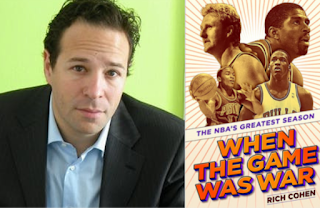



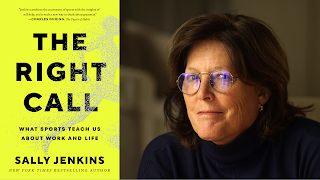
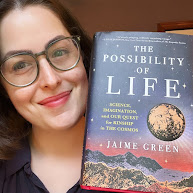

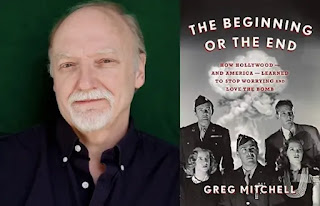











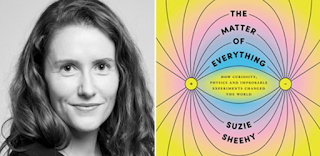


.png)

